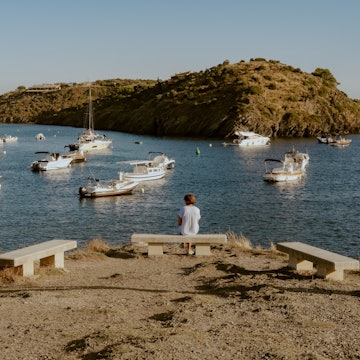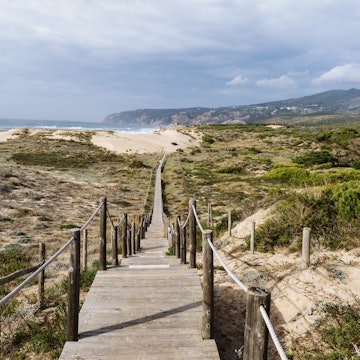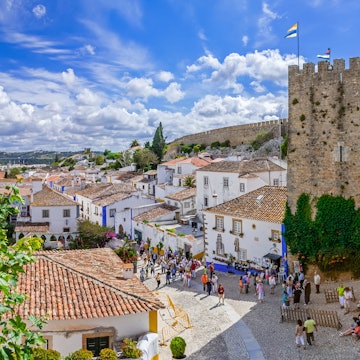
Passport to Portugal: Six ways to dive into its culture
Sponsored by

May 17, 2024 • 6 min read

Few countries pack as much to do into one small space as Portugal © Giacomo Augugliaro/ Getty Images
Few countries pack as much into one small space as Portugal. Neolithic carvings, Roman ruins and Moorish castles sit side-by-side with breathtaking mountain ranges, blue-flag beaches, canal-lined cities and enchanting villages.
Summer festivals pop up in otherwise quiet countryside towns and adventure sports alight on the coast and in the mountains, while artisan producers and makers fill shops, markets and homes with farm-to-table meals and hand-crafted wares.
Music, art, history and culture are interwoven into the fabric of the nation, making Portugal more than just a great place to visit – it’s a destination that literally has something for everyone.
Here are some of our favorite ways to take a deep dive into everything Portugalia.
Planning a trip to Portugal? Copy this weekend trip to Lisbon

Catch a Fado show in Coimbra
One of the first things that comes to mind when you think of Portugal is inevitably Fado. This unique music was born in the taverns of Lisbon, followed closely by a second genre of Fado that’s native to the north-central city of Coimbra.
Coimbra is home to the oldest Portuguese-language university in the world (whose dress code helped to inspire the Harry Potter school uniforms), where groups of students would gather in the streets to sing of love, longing and their beloved university.
Unlike Lisboa’s Fado, Coimbra’s Fado is meant to be sung outdoors, not in taverns, and the guitar is tuned lower to better fit the outdoor acoustics. The lyrics are poetic, well-rehearsed and typically more hopeful than the Lisboete style, and performers (who are all male) wear the requisite black university dress and cape to this day.
Catch a show at one of Coimbra’s most iconic Fado houses, like à Capella or Café Santa Cruz.

Delve into Portugal’s artistic traditions
The Portuguese countryside oozes cultural heritage, and you can visit its unique offerings in villages from the north to the south.
Stop by Podence or Lazarim during Carnival to see the Caretos dressed in their iconic colorful costumes or wooden devil masks or head down to Alentejo, where artisan craftsmanship is alive and well. At the local markets – some of which, like the monthly Azeitão Market, are events unto themselves – you’ll see age-old basketweaving, ceramics, leather and tapestry techniques on display (don’t forget to take home some souvenirs).
In the Portuguese art world, quality trumps quantity. You may not find massive art institutions here, but you will find galleries showcasing unique works from the past and present – including homegrown Portuguese legends. Check out the Museu Coleção Berardo in Lisbon’s Centro Cultural de Belém for some of the country’s most daring exhibits; in Cascais, a celebration of Paula Rego – one of Portugal’s finest postwar painters; and in Porto, the cutting-edge exhibits in the art-deco mansion of Sarralves.
From Globus | Art & Soul: Portugal By Design, No matter how you awaken your spirit in Portugal, with complimentary YourChoice Excursions, you choose how to be moved.

Eat your Heart Out
There’s another form of artisanal production that makes Portugal famous – and this one’s edible.
Take a trip through the flavors of the nation, munching on cheese from the Serra de Estrela; olive oil from Alentejo; or canned sardines from Pinhais in Matosinhos – the only cannery whose process is still 100 percent artisanal (aka, they do everything by hand).
Small batch growers, local artisanal farmers and producers make wine, cheese, olive oil, honey, conserves, sweets and more, all over the country, with each product defining the region it came from.
There’s also wine from the Douro to be savored (or port wine from Porto, should you prefer), Nevadas from Pencova to munch on and the unmissable Pastel de Belém, sold just outside of the Mosteiro dos Jerónimos, where the delectable sweet was born.

Get Outdoors
After all that eating, you might be craving some time outdoors – and whether you’re looking to lie down on a beautiful, blue-flag beach, take a scenic hike through the hills or paddle into the Atlantic’s waters, Portugal’s got you covered.
Surf fanatics should visit the World Surf Reserve in Ericeria, see the WSL event in Supertubos in Peniche or watch the world’s largest wave break from Nazaré’s clifftops.
For those into trekking, take a walk on the breathtaking Rota Vicentina along Alentejo’s southern coastline or hike through the Peneda-Gerês National Park – one of the country’s best-kept secrets.
Beach lovers will of course flock to the Algarve’s sunny shores, but it would be a mistake to overlook the more authentic offerings along the shores of the Silver Coast – the less-crowed stretch of coastline between Ericeira and Porto, where Santa Cruz and Figueira da Foz are two all-time favorites.
From Globus | Taste of Portugal – From Porto to Lisbon, your senses are filled with visions of natural wonder, wonderful wines, tempting tastes and amazing artistry on this escorted tour.

Take in Some History
Now that you’re rested, it’s time to discover a bit more about Portugal’s past – which includes every major player from the Celtics to the Romans to the Moorish Empire. The best Roman ruins are found in Evora, a UNESCO World Heritage city and the capital of Alentejo. Evora’s 2,000-year-old Temple of Diana is one of the most important and iconic ruins in the country – although it’s dwarfed in size by the Roman ruins of Conímbriga, outside of Coimbra.
The Moors had their strongholds further South, where towns like Aljezur (whose name comes from the Arabic word aljezeer, meaning, ‘the island’) and Silves (home to one of the most complete Moorish castles) still bear their mark. In Mertola, near the coast of Spain, there is even an annual celebration of Moorish history and Arabic culture at the incredibly animated annual Islamic Festival.

Soak in the City of Light
Then of course there is the start and end to nearly any Portugal itinerary: Lisbon, the capital city, aka a Cidade de Luz (the City of Light.) They weren’t kidding, either. Lisbon's postcard-perfect panorama of cobbled alleyways, ancient ruins and white-domed cathedrals is a captivating scene crafted over centuries.
While you’re wandering through Barrio Alto’s narrow streets or strolling along the Tejo River, watch how the light reflects off the azulejo (ceramic tile) covered buildings and dances along the water. Enjoy a spectacular sunset from one of Lisbon's twenty miradouros (look out points), like the Miradouro de Santa Luzia or the Miradouro de São Pedro de Alcântara.
From Globus | Portugal In Depth – From the granules of golden sand to the rich nuggets of history, this enlightening tour of Portugal introduces you to the brightest sights of the country.

Globus Tours connect you to the best of Portugal
Trying to fit all that a country has to offer into one itinerary can be more than challenging, which is why it pays get some help. No matter your interests, Globus Tours has a getaway for you, your family or your group (or can easily personalize or create a bespoke one that fits all your needs).
Whether you’re looking for a classic Portuguese Escape, are hoping to find the Art & Soul of the country or need an "Escape" from the crowds, it’s easy to let Globus Tours handle the planning while still giving you the flexibility to choose your own activities.
If you have the time, add on the Azores Islands to your trip. Residents of this tiny archipelago have a slower, more friendly, authentic way of living, which makes for an unforgettable end to any Portuguese adventure.
Sponsored by Globus
As a travel entertainment and inspirational media outlet, we sometimes incorporate brand sponsors into our efforts. This activity is clearly labeled across our platforms.
This story was crafted collaboratively between Globus and Lonely Planet. Both parties provided research and curated content to produce this story. We disclose when information isn’t ours.
With sponsored content, both Lonely Planet and our brand partners have specific responsibilities:
-
Brand partner
Determines the concept, provides briefing, research material, and may provide feedback.
-
Lonely Planet
We provide expertise, firsthand insights, and verify with third-party sources when needed.















